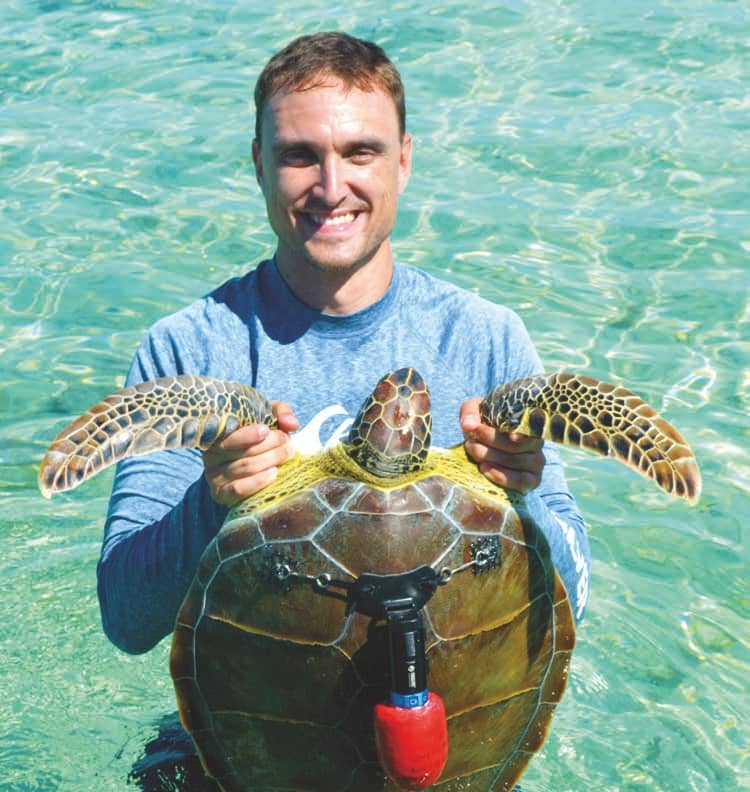Intentar ORO - Gratis
Turtlecam
Muse Science Magazine for Kids
|January 2020
Underwater video reveals secret life of sea turtles

The video showed sea turtles chasing and biting. They were nudging and nuzzling each other too. No one was more surprised than the scientists who filmed them. Why? Because sea turtles have always been thought to be loners. Turns out, these ocean reptiles may not be total party animals, but they do like to check each other out sometimes.
Marine biologist Nathan Robinson studies juvenile green sea turtles in the Bahamas. He designed and built a camera that fits on a sea turtle’s shell. He calls it TurtleCam and uses it to record the animals’ underwater activity. At first, he wanted to use the footage to find out what they were eating. Robinson wondered if there was enough food for all the turtles that lived around the island. But he learned far more than that.

Cool Discovery
Yes, the turtles were foraging for food. But each video also shows them interacting. Sometimes they rub up against one another in a friendly way as if they’re giving a hug. Sometimes the turtles are kind of pushy, nipping or bumping into one another.
Robinson says he’ll need to collect a lot more data to explain exactly what this turtle behavior means. But he and other scientists who look at the video footage think one of the reasons might be that the turtles are protecting their territory.
Esta historia es de la edición January 2020 de Muse Science Magazine for Kids.
Suscríbete a Magzter GOLD para acceder a miles de historias premium seleccionadas y a más de 9000 revistas y periódicos.
¿Ya eres suscriptor? Iniciar sesión
MÁS HISTORIAS DE Muse Science Magazine for Kids

Muse Science Magazine for Kids
ANIMAL FIREFIGHTER TO THE RESCUE
Can animals help manage the risks of deadly wildfires?
3 mins
Muse July 2025: The Story Behind Wildfires

Muse Science Magazine for Kids
FIRE DANGER
WHY THE RISK OF WILDFIRES KEEPS GROWING
4 mins
Muse July 2025: The Story Behind Wildfires

Muse Science Magazine for Kids
The Miller NEW Normal
WHAT TODAY’S WILDFIRES TELL US ABOUT OUR FUTURE
8 mins
Muse July 2025: The Story Behind Wildfires

Muse Science Magazine for Kids
WOMEN AND FIREFIGHTING: A GOOD FIT
Jessica Gardetto is a firefighter. Her father was, too. “I grew up with my dad coming home smelling like wildfire and covered in soot,” she says.
1 min
Muse July 2025: The Story Behind Wildfires

Muse Science Magazine for Kids
What is happening on your fingertips when they get all wrinkly in a hot tub?
—Felix G., age 10, Montana
1 mins
Muse July 2025: The Story Behind Wildfires

Muse Science Magazine for Kids
WHEN the SMOKE CLEARS
THE LINGERING EFFECTS OF THE RECENT PACIFIC PALISADES AND ALTADENA EATON FIRES
6 mins
Muse July 2025: The Story Behind Wildfires

Muse Science Magazine for Kids
PICKING TEAMS
Keep it fair with a strategy that relies on geometry.
2 mins
Muse July 2025: The Story Behind Wildfires

Muse Science Magazine for Kids
SHAN CAMMACK
WILDLIFE BIOLOGIST AND FIRE SAFETY OFFICER
3 mins
Muse July 2025: The Story Behind Wildfires

Muse Science Magazine for Kids
Scientists Create Mice With Woolly Mammoth-Like Fur
RESEARCHERS AT A COMPANY IN TEXAS ARE WORKING TO CREATE A LIVING ANIMAL THAT RESEMBLES THE EXTINCT WOOLLY MAMMOTH. Recently, they produced mice with traits of the large mammal. The mice all have coats with mammoth-like fur, and some of the small mammals also have genes that help them store fat. Both features would help the animals survive in the cold Arctic, where the woolly mammoth once lived.
1 min
Muse July 2025: The Story Behind Wildfires

Muse Science Magazine for Kids
Cool Sunshade Added to the Nancy Roman Space Telescope
THE NANCY ROMAN SPACE TELESCOPE IS A NEW TELESCOPE THAT NASA IS BUILDING AND WILL LAUNCH INTO SPACE, LIKELY IN EARLY 2027.
1 min
Muse July 2025: The Story Behind Wildfires
Translate
Change font size
